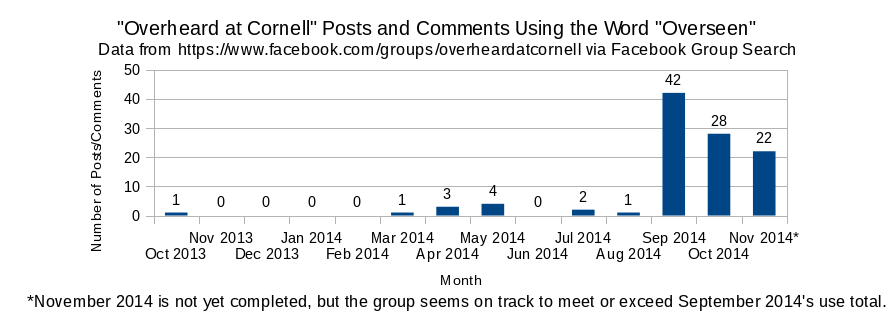Network Effects in Language Change
Like any red-blooded Cornellian (pun intended), I belong to the Facebook group “Overheard at Cornell,” a massive compendium of funny, scary, and sad quotes that members of the Cornell community have heard others saying around campus. Another student has used information cascades to analyze patterns of “likes” on “Overheard” posts. I’m going to look into the trend in usage of a particular word in the group, a word with a meteoric rise to popularity.
In addition to quotes, there is another breed of posts on “Overheard,” those including pictures of funny things seen all over campus. These photos are often accompanied by the caption or hashtag “overseen.” As a linguistics major, I was fascinated by the use of this word as a vision-based correlate to “overheard,” and so I decided to look into its origins and how it came to be used among Cornell students.
My original intuition was that “to oversee” has one established meaning, namely, “To see to officially, as one in charge of work done by others; to supervise…” (Oxford English Dictionary online). I therefore looked upon the usage of “overseen” on “Overheard at Cornell” as a new one, an example of language change creating a novel denotation. However, scrolling through the depths of definitions that the OED provides, I stumbled upon exactly the meaning that intrigued me: “To catch sight of, glimpse; to observe secretly, spy on.” This meaning is not new at all; citations date back to 1735! The OED indicates that this meaning is “now rare,” with the last given citation from 1999.
I did some more research on the Web presence of “overseen.” A quick Google session reveals widespread use with the meaning “caught sight of/glimpsed.” The Twitter account “Overseen at VT,” created in 2012 and boasting almost 3,000 followers, collects funny photos tweeted by the Virginia Tech community. The grammar blog “Mighty Red Pen” has an “overseen” post tag, with posts of funny images dating back to 2007. Based on my anecdotal experience, it seems that a meaning classified as rare is making a comeback on the Web.
So how common is the term “overseen” on “Overheard at Cornell?” Starting on October 1st, 2013, when a commenter gave us its first usage in the group, there have been 99 posts including the word “overseen,” as well as 5 comments on other posts using the term. Use of the word was minimal for nearly a year; it only began appearing in earnest in September 2014. It peaked in that month, decreasing significantly in October. However, it appears to be off to a strong start in the first half of November.

We can use network effect concepts to analyze these usage patterns. The spike in the use of “overseen” in September corresponds to the beginning of a new school year. And with a new school year come new students. Freshmen and new transfers flood “Overheard at Cornell,” seeking to become part of the campus community and privy to the injokes of the group. And as new members looked back at recent posts, it’s likely that they saw several popular posts that used the term. While I don’t know the details of Facebook’s post sorting algorithm on pages, I know that posts are not sorted just chronologically, but that popularity also plays a role. And the few posts using the term from May-August 2014 were quite popular. One of the posts from July currently has 647 likes, and the other has 239. One post from May has 400 likes, and another 177. One post from April has 240 likes. Therefore, even though there were quite few posts using the word “overseen” in the months before September 2014, it is likely that a new member looking back at posts on September 1st would have seen several extremely popular posts that used this word and deduced that it was part of the common parlance of the group.
This assumption carries with it both information benefit and direct benefit implications. New members received the information (arguably false, given the group’s history) that the word “overseen” was a common one that all group members would agree upon and understand. They also received the information that displaying posts of funny “overseen” things was a common and accepted purpose of the group, a notion that some commenters as recently as November 2014 seem to disagree with. As for direct benefit, there is an advantage to using language that one perceives as popular in (or even exclusive to) the group. Much like going to a party because many other people will be there, using what we might call “in-language” allows a new member to develop relationships with other members of the group and adopt the community identity.
Once the word is adopted by new posters and becomes popular in this subgroup, it has similar effects on established group members. All members receive information about the popularity of the term and its newfound importance to the group identity. As Cristian Danescu-Niculescu-Mizil et al. (2013) write about online communities, “As members join and depart, the interactional norms evolve, stimulating further changes to the membership and its social dynamics. Linguistic change—in the sense of innovation that becomes accepted as the norm—is essential to this dynamic process: it both facilitates individual expression and fosters the emergence of a collective identity.” Of course, given the subsequent drop in “overseen” use in October, it is possible that the word was not adopted immediately by many group members. However, given the trend for this month, it is possible that it is still gaining traction and will eventually become entrenched in “Overheard at Cornell” culture.
Sources:
http://www.oed.com/view/Entry/135034
https://twitter.com/overseenvt
http://mightyredpen.wordpress.com/category/overseen/
http://www.mpi-sws.org/~cristian/Linguistic_change_files/linguistic_change_lifecycle.pdf
